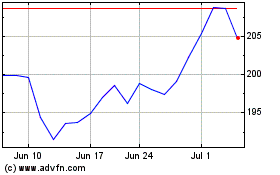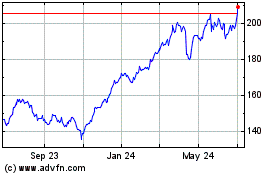ECB Leaves Rates Unchanged
April 21 2016 - 8:40AM
Dow Jones News
The European Central Bank left all its interest rates unchanged
at its rate call Thursday, matching economists' expectations.
The central bank said it had started to expand the monthly
purchases under its asset-purchase program to €80 billion ($90.8
billion). The central bank had announced this change at its
previous meeting in March.
"The focus is now on the implementation of the additional
nonstandard measures decided on 10 March 2016," the ECB said in its
rate announcement. It said further information on its corporate
bond purchase program, also announced last month, would be released
after the ECB's news conference that is due to start at 12:30
GMT.
The ECB's decision follows dramatic moves by the central bank
last month, when it cut all its interest rates, increased the size
and scope of its bond-buying program and offered loans to banks
designed to encourage them to lend to firms and households. The
ECB's main interest rate is at 0% and its deposit rate is minus
0.4%, meaning banks pay to park excess funds with the central
bank.
The ECB's policy announcement comes as the eurozone continues to
struggle to lift inflation in the currency bloc back to the central
bank's medium-term target of just below 2%. The most recent data
showed inflation unchanged on the year. At its March meeting, the
ECB issued its staff forecast showing that inflation was due to be
only 0.1% this year, rising to 1.6% in 2018.
Central bankers aim to avoid price falls, or deflation, over
concerns that consumers will delay purchases in anticipation of
lower prices. Such an environment can lower standards of living,
while making it more burdensome to pay down debt. The ECB hopes
that its far-reaching, accommodative policy measures can revive
both inflation and economic growth in the eurozone.
Market attention will now turn to ECB President Mario Draghi's
regular news conference. Economists expect the ECB to stress the
effectiveness of the policies announced last month, while also
leaving the door open to do more later.
Mr. Draghi will likely be pressed on what further measures the
central bank could activate if inflation doesn't pick up
sufficiently. One idea that has attracted significant attention
recently is direct transfers from the central bank to individuals
and firms, often known as "helicopter money."
At the last news conference in March, Mr. Draghi said that while
the ECB hadn't discussed the idea, it was an "interesting concept."
Since then, many Council members have played down the idea, but the
topic will likely come up at the news conference.
The ECB has faced criticism over its policies. In unusually
blunt comments about the central bank, German Finance Minister
Wolfgang Schä uble suggested its low-interest rate policy was
partly to blame for the rise of an anti-immigrant party in
Germany.
But even Bundesbank President Jens Weidmann, long a critic of
Mr. Draghi, has backed the ECB chief. In Washington recently, Mr.
Weidmann said the ECB's current "expansionary monetary policy is
appropriate," because it is shaped for the eurozone as a whole
where the economic outlook is different from Germany's.
Mr. Schaeuble has since tried to dilute his earlier critical
comments. Last week he said that very low rates, or negative rates,
create insecurity among Germans that "will be felt in elections."
But, he said, "That's not the fault of the ECB."
Write to Todd Buell at todd.buell@wsj.com
(END) Dow Jones Newswires
April 21, 2016 08:25 ET (12:25 GMT)
Copyright (c) 2016 Dow Jones & Company, Inc.
JP Morgan Chase (NYSE:JPM)
Historical Stock Chart
From Mar 2024 to Apr 2024

JP Morgan Chase (NYSE:JPM)
Historical Stock Chart
From Apr 2023 to Apr 2024
